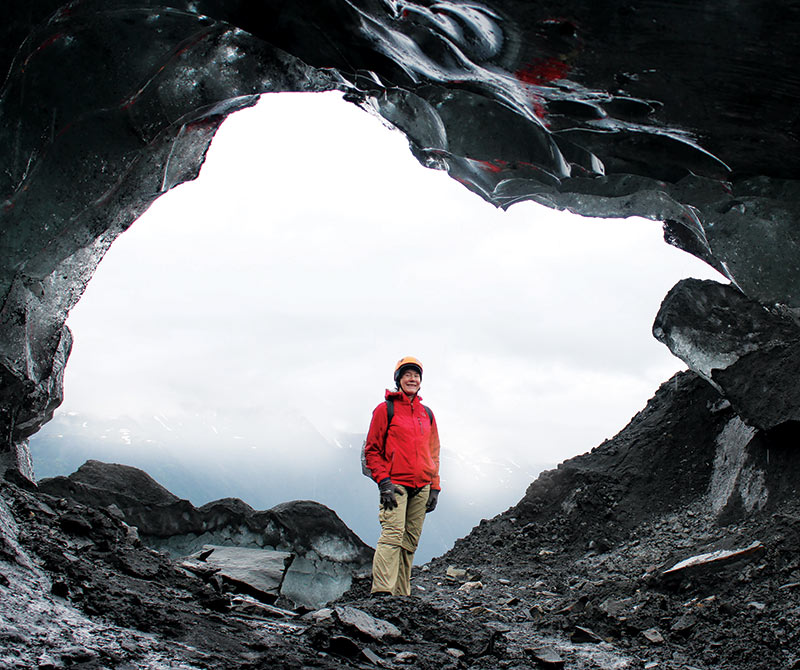Energizing Change: Ellen Williams
Spring
2019
Feature
Energizing Change: Ellen Williams
Rachel Kaufman, Editor
Ellen D. Williams has a storied career in surface statistical mechanics, nanoscience, and energy technology.
Next fall, the former head of the Advanced Research Projects Agency-Energy (ARPA-E) is bringing her wisdom, experience, and climate optimism to PhysCon to inspire the next generation to use their physics knowledge to solve the world’s most pressing energy problems.
Climate change “is very scary, [but] I have to be optimistic. We can do it—and we just have to do it,” Williams says.
In a way, coming back to energy innovation—both at ARPA-E and in her post-ARPA-E career—is coming full circle for Williams, who was very excited about environmental issues way back in high school. But as an undergraduate, she became “more oriented toward physical chemistry,” and eventually, surface science. Her research at the University of Maryland focused on studying the growth of materials used in semiconductors.
For decades she did this work, racking up numerous publications, awards, and honors along the way. Then in 2010, BP came knocking.
“I was invited to apply for the position of chief scientist at BP, and I thought, ‘How could I possibly do that?’ And then I thought, ‘Maybe I could.’” Williams was still interested in energy and climate change, and at the time, BP was investing in solar and biofuels, so it seemed like a match. During her tenure at BP, Williams ran a sustainability initiative at the company and led the creation of reference publications on oil and gas’s impact on the environment, specifically on water, land, and scarce materials, in addition to climate change.
In 2014, Williams was tapped by Ernest Moniz, then the US secretary of energy, to head up ARPA-E, the DOE’s agency focused on identifying and funding cutting-edge energy technologies. “It’s a great agency, it was a wonderful job. I had an incredibly productive time there,” she says.
It’s harder than it sounds to identify new energy tech. “The energy field is a very old field,” she says, “and basically everything you could possibly imagine has been tried—and failed for one reason or another. So the big question is whether there is a new approach, something we could do now that we couldn’t do in the past, that’s going to work this time.”
As director she oversaw the creation of new grantmaking programs such as ROOTS (Rhizosphere Observations Optimizing Terrestrial Sequestration), a program to develop technologies to monitor roots from above the ground. Researchers hope to develop plants that can sequester carbon deep underground in their roots, but without a way to monitor what’s going on deep in the earth, it’s hard to know if the strategies are working.
That program is ongoing, though with practical, applicable results years away. Other projects are bearing fruit. Makani Power, a project to harness electricity from kites which is now part of the Google offshoot X, received investment from ARPA-E years ago and is now being commercialized. But at the time that Makani asked for money, its proposal “was really actively discussed with the thought, Is this too far out?” Williams says.
Yet other technologies are even more surprising. Williams describes a coating developed by Stanford scientists, now being commercialized under the name SkyCool Systems, that is so reflective that using the principles of radiative cooling, it actually gets cooler under the sun. “Twenty years ago I would have said, ‘That’s not possible.’ And now . . . we can just do so many more things now than we used to be able to do.”
With the change of administration in 2016 came another job change, and Williams found herself back at UMD, teaching, researching, and consulting on energy technology innovation. “It was actually a bit of a surprise [to be back in the energy research field]” after all these years, she says. “I went away from that path [but] it never left me. But the skills I developed through my life made it possible for me to make that transition,” she says. In addition to teaching, she’s serving on the Maryland Energy Innovation Initiative’s advisory board, helping Maryland energy companies jumpstart their technologies.
Williams recommends undergraduates focus on developing skills, even if they don’t seem to connect immediately. “Find the things that excite you and that you can do well, and get really good at them,” she says. “And then you can take those skills and go out and find the problems where you can have an impact.” 
